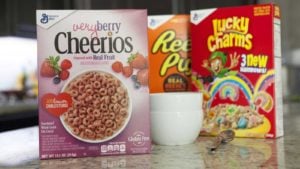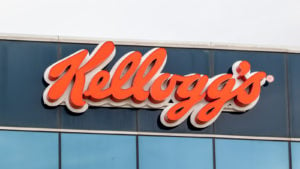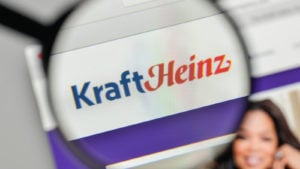You can live without an iPhone. You can live without a new house. Even the latest Hollywood thriller isn’t something that’s absolutely necessary. However, you can’t live without food – and that’s what makes food stocks a key investing priority of long-term conservative types.
Food companies are the ultimate value stocks, given that they’re consistently profitable. When times are good, food stocks consolidate and create value with brand extensions. In times of inflation, these companies keep margins high by making smaller packages for the same price. Indeed, even in times of recession, investors clamor to hold food stocks, given the essential products they provide to a clientele that’s still buying, even when they’re cutting back everywhere else.
Not all food stocks are great investments. This year, various protein players in the market like animal protein company Tyson Foods (NYSE:TSN) and plant-based protein company Beyond Meat (NASDAQ:BYND), have been losing investments.
That said, food stocks that operate in grain-based segments of the market appear to be handling inflation the best. Despite the price of wheat surging from around $8/bushel in 2022 to much higher levels flowing the the Russian invasion of Ukraine, the willingness to pay of consumers among grain-based foods appears to remain high.
Thus, whether we’re talking about cookings, chips, or bread, consumers want it, and are willing to pay up. Indeed, I think 2023 could be set up as a year for staples. Accordingly, here are three companies worth considering right now.
| GIS | General Mills | $79.77 |
| K | Kellogg’s | $70.03 |
| PEP | Pepsico | $180.03 |
| KHC | Kraft Heinz | $37.75 |
| MCD | McDonald’s | $273.36 |
General Mills (GIS)

First on my list of top food stocks to buy is giant General Mills (NYSE:GIS). From a performance standpoint, it makes sense to start here. That’s because the stock is up about 16% this year. Recently, General Mills increased its dividend 6% to $2.16 per year, reflecting a yield of 2.8%. It currently has a price to earnings multiple of 16.5-times.
General Mills’ success comes from processing grains and milk into highly-profitable products. Famously, the company makes brands such as Old El Paso Mexican food and Totino’s pizza, Yoplait yogurt and Haagen-Dazs ice cream. General Mills also makes Blue Buffalo dog food, Epic protein bars, Bold Cultr milk-free cheese and Annie’s macaroni and cheese.
That’s a long list to be sure. But the business is relatively simple, starting with milling grain into cereal and flour. However, turning a commodity into something consumers want isn’t easy. Accordingly, the company’s CEO has long said General Mills’ brands must “stand for something.” That’s because the company is in a constant fight against generics and store brands.
Analysts seem to like the company’s business model, with Jefferies analysts projecting GIS to turn in earnings of $1.14 per share next quarter. Similarly, other analysts have been raising their price targets.
The key reason to own GIS stock is its defensive posture and diversified portfolio of brands. This is a slow-growing company, but in a slow-growth economy, that could be just what investors need.
Kellogg (K)

In 2022 Kellogg (NYSE:K) lost patience with breakfast cereal. I think what’s turned out to be a dramatic shift for the company could result in faster growth ahead.
The company announced in June it will spin-off its North American cereal business. This massive segment provided sales of $2.4 billion, making its cereal business a significant company in its own right. Overall, the company plans to separate into three independent companies, in a bid to accelerate growth.
The pre-split company, with sales of $14.2 billion in 2021, is now worth $23.9 billion, up about 5% on the year. That translates to a price to earnings ratio of around 16-times, with a dividend yielding 3.4%. If the break-up works as intended, it should yield faster growth for the main company and two attractive buy-out candidates for investors.
Tomorrow’s Kellogg will be a global snacking business, using some of the cereals’ branding. North America will represent half the new Kellogg’s sales. The division represents 80% of total sales.
Since the split was announced, Kellogg stock has traded sideways. That’s because investors and analysts gave a thumbs-down to Kellogg’s third quarter numbers, which showed almost no growth. Operating cash flow during the quarter, however, rose to $1.18 billion.
Pepsico (PEP)

Pepsico (NYSE:PEP) is best known for soda. But it’s also the biggest food processor in the U.S. On a global scale, it’s number two, behind only Nestle (OTCMKTS:NSRGY).
Most of Pepsi’s food sales come from the acquisitions of Frito-Lay in 1965 and Quaker Oats in 2000. When Pepsi bought Quaker Oats, it was assumed drinks like Gatorade would be the star. But Quaker also makes snack bars and cookies.
The company wins by being constantly ready to innovate. This year, Pepsi announced it will introduce Ghost Kitchens to help its partners deliver hot food to consumers based on its brands. It’s replacing diesel with cooking oil in some of its delivery trucks. Further, the company is investing directly in global agriculture, and is quietly moving into alcohol.
In its third quarter report, Pepsi’s net income grew to 8.8% year-over-year, coming in at $2.7 billion or $1.95 per share. These earnings came on revenue of $21.97 billion. Analysts worried that food sales fell 1.5% but most still have a buy rating on the stock.
Pepsi is often compared to Coca-Cola (NYSE:KO), but the two companies are very different. Coke remains committed to beverages, recently adding coffee and sports drinks brands to its portfolio. Pepsi remains tied to food, linking with Beyond Meat last year. The two debuted a plant-based beef jerky in May.
Pepsico is a steady performer, providing welcome diversification in any portfolio that may get bloated with technology and other fast-growth stocks. Pepsi shares are up 57% in the last 5 years, and are even up this year. The company’s dividend, now yielding 2.6%, is also always welcome by long-term investors.
Kraft Heinz (KHC)

Many laughed when Warren Buffett of Berkshire Hathaway (NYSE:BRK-A) combined Heinz with Kraft Foods in 2015, under the leadership of Brazil’s 3G Capital, to create Kraft Heinz (NYSE:KHC).
While some are still launching, and Kraft Heinz likely remains one of Buffett’s few mistakes, I think this is a stock worth considering. Shares of KHC stock are still down about 50% from where they were when the deal was done. However, Berkshire still has a 26% stake in the company, and under CEO Miguel Patricio, progress is finally being made. The stock held its own in 2022, with investors attracted by a dividend yielding 4.3%.
For the September quarter, Kraft Heinz beat estimates with net income of $432 million, or 35 cents per share, on revenue of $6.5 billion. The company reaffirmed guidance of high single-digit growth. Net income was down, but the company cut its debt and future interest costs during the quarter.
When Kraft was split up a decade ago, higher-margin products like Oreo cookies went to a new company, Mondelez International (NASDAQ:MDLZ). The assumption was that cookies would out-run things like Velveeta, Heinz ketchup and Oscar Meyer deli meats. Over the last five years, that’s been the case, with Mondelez up 53% and Kraft down a similar amount. An accounting scandal late in the last decade didn’t help.
However, in 2022, this trend has reversed. Mondelez is down and Kraft Heinz is up, if only by a little bit. Patricio shed Planter’s nuts and the company’s natural cheese business, focusing instead on quirky marketing for traditional brands. Patricio insists the best is yet to come, and he’s seeking innovation with plant-based cheese. I agree, and think now is the time to get into KHC stock.
McDonald’s (MCD)

Ever since former CEO Steve Easterbrook shifted the company’s strategy in 2015, McDonald’s (NYSE:MCD) has been a winning investment. Shares of MCD stock have risen at twice the rate of the S&P 500, and the company’s dividend is up 62% to $6.02 per year, yielding 2.2%.
The key for these results appears to be the company’s supply chain, on which McDonald’s spends $14 billion per year. This includes private protein providers like Tyson, but also thousands of other, mainly privately-owned, food companies.
Long-term, mutually-profitable relationships are what make McDonald’s the world’s largest food service operation. With over 38,000 locations in 100 countries, 93% of McDonald’s locations are operated as franchises.
Easterbrook left after a sex scandal in 2019, but successor Chris Kempczinski continued in the same strategic direction. Thus, strong performance has been reflected in the company’s numbers. Last year, McDonald’s brought in margins of 32% on its whopping $23.2 billion in revenue. While the company’s market capitalization sits right around $200 billion, almost six times that of its nearest rival YUM! Brands (NYSE:YUM), I still think this is a stock with more upside from here.
On the date of publication, Dana Blankenhorn held a long position in PEP. The opinions expressed in this article are those of the writer, subject to the InvestorPlace.com Publishing Guidelines.
